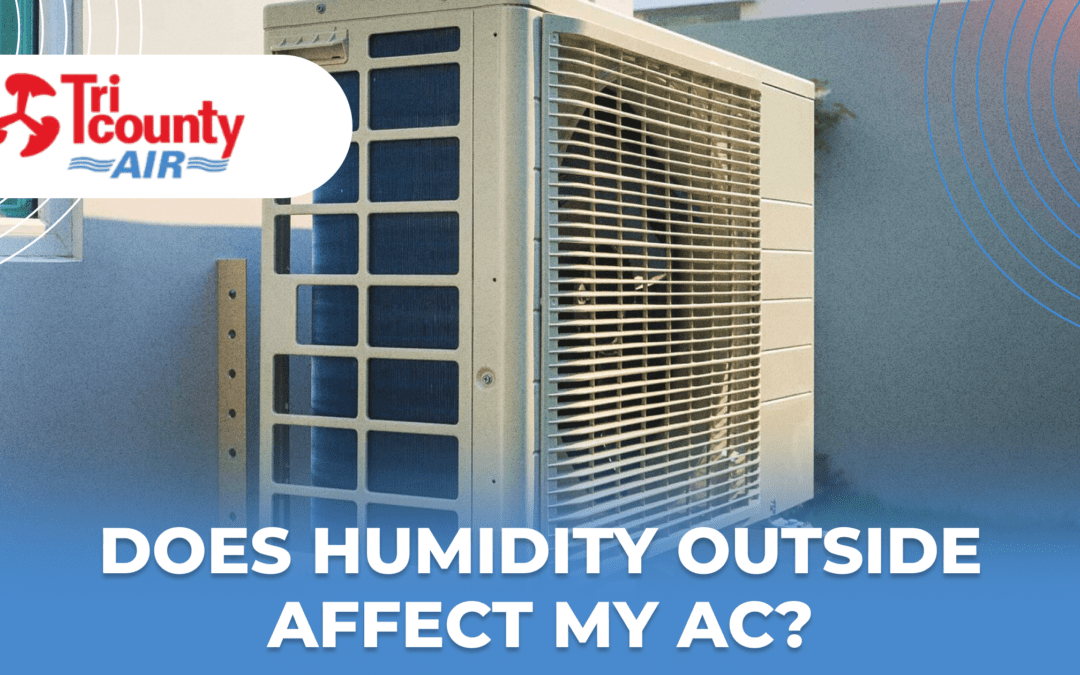High humidity inside and outside can have an impact on your air conditioner. Ideally, the humidity level should be below 60% in your home or business. An AC is designed to remove heat and moisture, but higher humidity outside can negatively affect its ability to cool.
A spike in humidity can make it hard for your HVAC system to cope. Increased moisture content makes it feel warmer than it actually is, and can cancel out the cooling effect of the system. Running the AC longer or at a lower temperature setting may not achieve the desired results. Nevertheless, you’ll end up paying more in cooling costs.
Effects of High Humidity
Even if you have every window and door closed, and it’s humid outside, your skin may feel clammy while indoors. Moisture may even cause your windows to fog up. And when there is persistent dampness, you may start to notice a musty odor.
But in addition to making it feel hotter, high humidity can damage your AC. If your air conditioner isn’t built with a dehumidifier, greater demand can strain it. That’s because as higher moisture content makes the air warmer, the system must work harder. Wear and tear can lead to mechanical and electrical issues and the need for AC repair. High humidity can also promote mold and algae growth within ducts, triggering allergic reactions and further reducing indoor air quality.
How Can My Air Conditioner Worsen the Problem?
You may think that a more powerful air conditioner can counter the effects of high humidity outside. But the opposite is true. If you have a higher capacity AC than is needed, it won’t run long enough to remove enough moisture. Indoor air will still be humid and outdoor conditions won’t help the matter. There are also other factors that affect how conditions outside affect your AC, including:
- Air Conditioner Speed: A single-speed AC only runs at full blast. Once it cycles off it won’t turn on again until the temperature goes above the thermostat setting. Your home will be more humid, but a variable speed system is much more effective at removing humidity.
- The Fan Runs Continuously: While fans produce a wind chill effect and make you feel cooler, they can blow moisture back into your rooms. Your AC may have previously removed it, but moisture must condensate in order to drain away; the fan may not give it a chance to do this.
- Negative Air Pressure: Design issues with your ventilation system can cause too much air to be vented. Outside air is drawn in. So, if it’s muggy outside, things will get quite sticky in your home. The only resolution may be to redesign your ventilation system.
An older AC may cause trouble as well. Worn parts and a lack of maintenance can lead to inadequate cooling and inconsistent temperatures, which in turn affect humidity control. Regardless of the humidity outside, it may be time to consider repair vs. replacing the unit.
Can a Dehumidifier Improve My AC System?
Pairing a dehumidifier with your HVAC system allows it to adjust both temperature and humidity. This may seem like more for it to do. However, good humidity control allows an AC to do its job better. You’ll feel cooler and your energy bill may be lower.
Contact Tri County Air
At Tri County Air, we can address indoor humidity issues in Florida and provide all types of AC service. We’re committed to helping your air conditioner last longer and run more safely. Whether you need AC maintenance, repair, or replacement, our licensed technicians can provide the service you need, while ductwork, insulation, and air quality services are also available to clients in Manatee County, Sarasota County, and Charlotte County. To request an appointment, contact us online or call (941) 485-2222.

